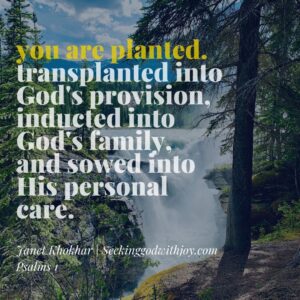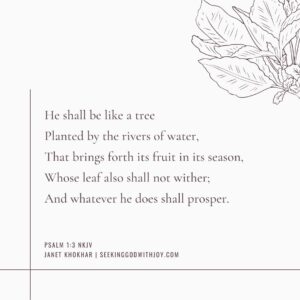Series: Change your life in a journey through Psalms
This is the first post of what I hope will be a journey through the whole book of Psalms. Big task. So I’m starting at the very beginning. Join me?
Part 1: Standing Alone



If you want to know God, you may have to get used to being alone.
Because sometimes standing up for what you believe means you stand alone. Everyone who longs for more, who has a soul-craving that won’t go away, is longing for God and for a reunion with Him in heaven one day.
But what about this life?
What do we do with this one life until we get to heaven? We all have a choice: God’s way or the world’s way. And God’s way is often against the current of our society’s values.
Psalm 1:1-2 gives us action words: walks not, nor stands, nor sits, delight, meditates. This is not passive, but active practice of resisting the world’s influence so we can grow closer to God and help the people God has called us to help.
As a Christian, becoming yourself requires active effort to resist how the world wants to shape you, and give your heart to the One who makes you new.
A new thing is, by necessity, alone because nothing else is quite like it.
Are we willing to stand alone so you can stand for God?
(P.S., Now that I’ve prodded you to stand alone for God, let me tell you this: alone in the world’s values is not alone in Christ, who gave you a whole new family to stand beside you. You belong. Let other people of faith encourage you, and you encourage someone else. That’s what families do.)’


Part 2: You are planted.
He shall be like a tree
Planted by the rivers of water,
That brings forth its fruit in its season,
Whose leaf also shall not wither;
And whatever he does shall prosper.
Psalm 1:3 NKJV
In seasons of instability, it’s easy to feel like nothing solid lays under our feet. Changes of current, shifting sands, contrary winds seem to arise out of calm skies and carefree days.
Right now I’m trying to plan for the financial future without a map, in the dark, with a busted flip flop. And then there’s deciding if I’ll continue homeschooling when schools fully open. And relationships. Need I say more? Some of them hurt and some of them hurt a lot.
Can you relate? Maybe you’re in that place now, or you almost certainly have been there before.
Psalm 1:3 gives us a snapshot of the true state of anyone who has decided to do life God’s way: in righteousness, sometimes standing alone.
The righteous person is like a tree planted, not sprouted from a seed blown by wind or dropped by a bird, but deliberately placed by the farmer in the right place to receive water.
Especially water offered in seasons of instability, uncertainty, and drought.
The Hebrew word for planted is shâthal, which means plant (verb), but also transplanted. We wild trees, unknown to Jesus, became well-tended trees, transplanted to God’s provision, inducted into God’s family, and sown into His personal care.
Charles Spurgeon, aka “The prince of preachers”, wrote, “The rivers of pardon and the rivers of grace, the rivers of the promise and the rivers of communion with Christ, are never-ending sources of supply.”
You and I, we need these never-ending sources of supply in every season so we can produce fruit and maintain supple leaves that won’t wither when the rain doesn’t come.
Fruit in season means we are fruitful at the right time – God’s time. Spurgeon preached that when the psalmist promised that neither our fruit or our leaves would wither, he was encouraging us to have faith that our godly works aren’t wasted but waiting, for God’s time, to use our fruit to bring nourishment and refreshment to others, comfort and joy to ourselves, and glory to God.
Spurgeon called this “soul prosperity.”
Soul prosperity.
That’s a phrase I can breathe in.
I can almost smell the river water.
We are planted.
